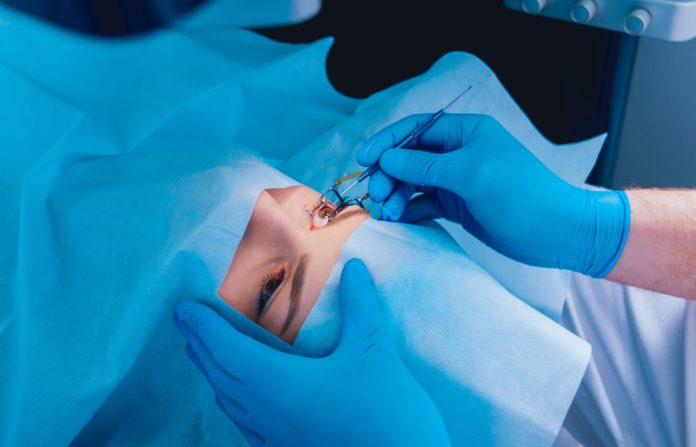What is LASIK eye surgery?
LASIK eye surgery is a well-known and widely used laser based refractive surgery for vision correction. LASIK (laser-assisted in situ keratomileuses) is a procedure carried out as an alternative to glasses and contact lenses. To improve vision, a specific type of cutting laser is used to change the shape of the transparent tissue at the front of the eye (cornea).
Why is LASIK surgery done?
LASIK surgery can be carried out to correct any one of the following vision problems:
- Nearsightedness or myopia – Light rays focus in front of the retina and not on it. Distant vision is blurred when the eyeball is unusually long or when the cornea curves too sharply. Objects that seem close can be seen clearly, while those far away are blurry.
- Farsightedness or hyperopia – Light focuses behind the retina rather than on it when one has a shorter than usual eyeball or an overly flat cornea. This causes blurry vision at far distances.
- Astigmatism – It occurs when the cornea bends or straightens unevenly, disrupting the focus of near and far vision.
People who already use glasses or contact lenses can consider LASIK surgery and are advised by the doctor only if the patient is a good fit.
Why should one consult a doctor regarding LASIK surgery?
Patients who do not meet the appropriate criteria for LASIK surgery must consult with their eye doctor for alternate treatments. To determine if LASIK eye surgery is the right choice for patients, the doctor may ask some or all of the following:
- If you are 18 years or below
- If you are pregnant or are nursing a child
- If certain drugs or medications should be taken can be taken.
- If you have a lot of adjustments to your eyesight prescription recently.
- If you have a thin or uneven cornea.
- If you have extremely dry eyes.
- If you have been diagnosed with glaucoma, diabetes, lupus, or rheumatoid arthritis
Call 1860-500-1066 to book an appointment
What are the potential risk factors associated with LASIK surgery?
Some of the common risk factors associated with LASIK eye surgery are as follows:
- Dry eyes – The eyes may feel especially dry during the first six months or more following the surgery as they recuperate, and dry eyes can harm the quality of vision. The eye doctor may recommend eye drops for treating dry eyes.
- Glare, halos, and double vision – After surgery, the person may have trouble seeing at night, normally lasting for a few days to several weeks. Improved light sensitivity, glare, color fringing surrounding bright lights, or double vision are all possible symptoms.
- Under corrections – One will not obtain the sharper vision outcomes that is required , if the laser removes too little tissue from the eye. Nearsighted people are more likely to have under corrections. They may require another LASIK treatment to remove additional tissue within a year.
- Overcorrections – Sometimes, the laser can burn away too much tissue in the eye leading to overcorrections. Overcorrections may be more difficult to treat than under corrections.
- Vision loss or changes – Surgical complications can cause eyesight loss in rare cases, and some people may not be capable to see as clearly as they earlier did.
What can one expect from LASIK surgery?
Before the procedure
People who are properly examined before surgery to verify that they are appropriate candidates for the treatment have the best long-term benefits from LASIK.
If one is wearing contact lenses, which might alter the shape of the cornea, they will need to stop wearing them for at least a few weeks before the examination and operation and wear spectacles. Furthermore, the doctor will check for signs of:
- Eye infection
- Inflammation
- Dry eyes
- High eye pressure
During the procedure
LASIK procedure takes 30 minutes or even less to complete. The patient will be lying on their back in a recliner chair for the process and maybe offered medication to help them relax. Equipment to hold the eyelids open after placing numbing drops in the eye is also used. Next, a little hinged flap is taken away from the front of the eye by the eye surgeon using a small blade or cutting laser enabling the doctor to reach the cornea area that has to be altered by folding back the flap. Furthermore, the eye surgeon shapes sections of the cornea with a controlled laser. Every pulse of the laser beam removes a small amount of corneal tissue. After reshaping the cornea, the surgeon adjusts the flap.
After the procedure
Eyes may itch, feel gritty, burn, or be runny right after the surgery, and the vision will most likely be hazy. However, there will be little pain in most cases, and the vision will return fast. A few hours after the treatment, the patient may be given pain medicine or eye drops to make themselves comfortable. Until the eye heals, the eye doctor may advise wearing a mask over the eye at night.
LASIK surgery is generally not advisable if you:
- Have a fairly good overall vision
- Have age-related eye changes which causes vision to be less clear
- Have an eye disease that may cause the cornea to bulge and thin, or if you have a family history of it
- Have very large pupils or thin corneas
- Have severe near-sightedness
- Participate in contact sports that may be linked to blows on the face
Conclusion
Often, LASIK offers improved vision without the hassle of wearing the glasses or the contact lenses. Generally, you have a good chance of getting back 20/25 vision or better after the refractive surgery. Over 8 out of 10 people who have undergone LASIK refractive surgery do not need to use eye glasses or contact lenses for most of their works.The results depend on your specific refractive error and other factors.


















